Products
Features
Solutions
At Virginia Commonwealth University (VCU), like many established academic institutions, the importance of seamless IT infrastructure and effective incident communication can't be overstated. VCU faced many challenges with its previous incident notification system, which was inefficient and limited in scope. The complexities of their system, and the substantial audience reliant on the services they maintain, led VCU to seek out a cutting-edge solution.
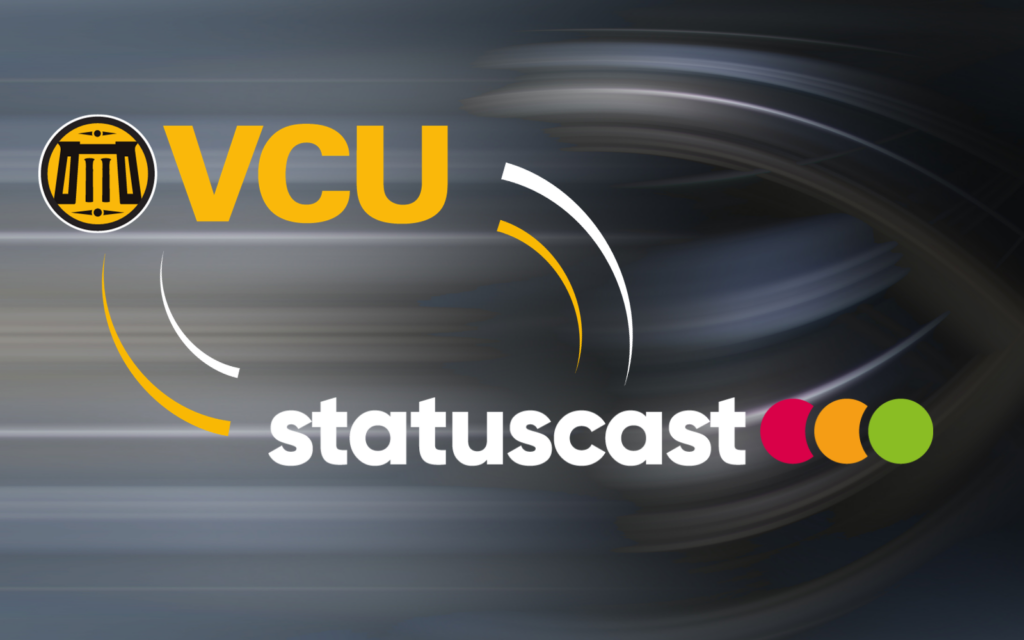
Status Page Views
in Status Page Subscribers
Notifications per year
Virginia Commonwealth University (VCU), located in Richmond, Virginia, is a premier public research university known for its esteemed School of the Arts and robust medical program. Established in 1968, VCU has grown into a hub of innovation and creativity, boasting a wide array of undergraduate, graduate, and professional degree programs across various disciplines. With a student body of over 29,000, the university provides a rich, collaborative and interdisciplinary environment for learning and discovery. VCU’s strong focus on research emphasizes real-world impact, attracting students and scholars from across the globe keen on contributing to the local community and beyond. Through its engaging academic culture and commitment to public service, VCU continues to uphold a tradition of excellence and societal contribution.
Industry
Higher Education
Employees
5,300
Use Case
Public Status Page

Prior to implementing StatusCast, VCU employed a basic alert system mainly focused on University-wide notifications such as weather updates, police notifications, and emergency closings. However, this system did not cater specifically to IT notifications. The existing platform was essentially a rudimentary website where notifications were posted sporadically. Though email notifications were an option, the subscriber base was limited to approximately 200 users.
With this setup, the first and second order effects of incidents proved to be significant. The community was being underserved with incident notifications because of limited subscriber capacity, all while the old system provided only sporadic notifications when incidents did occur, requiring a lot of manual input and management the entire time. This took a toll on the productivity of faculty and detracted from the learning experience for students. The reality of this incident process prompted VCU’s IT professionals to take the initiative to better position their organization for when incidents struck.
In addition to the limitations in outreach, the old system was cumbersome for technicians, who found it challenging to promptly and effectively communicate IT incidents to the affected users. The lag in communication not only impeded the timely resolution of issues but also impacted the university's bottom line, as precious time and resources were lost in manually organizing their notification efforts.
The need for a comprehensive, centralized status page that could keep the entire VCU community informed of major incidents and scheduled maintenance for IT systems was becoming more apparent.
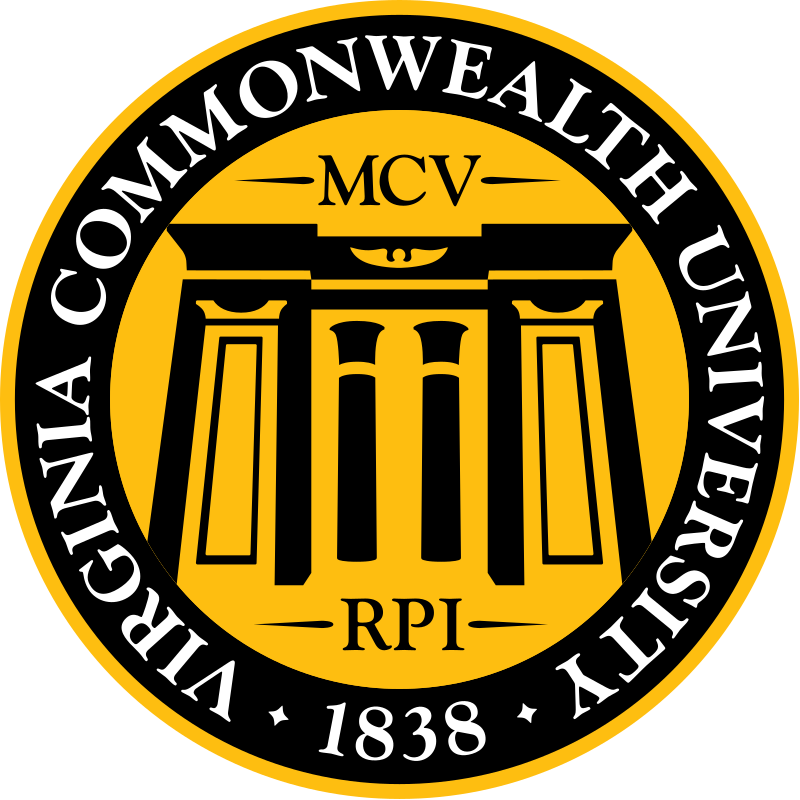
ITSM Data Analyst
"With the implementation of [StatusCast], we have been able to keep the VCU community notified of major incidents and any upcoming maintenance to any IT systems. We also have API settings to push the information to our VCU TS website, Twitter, and Slack. Having StatusCast has made it easier for us to get information out quickly and make sure that it reaches the necessary members of our community."
In the search for a status page solution, VCU’s aim was to centralize and streamline their communication process, ensuring rapid dissemination of crucial information to the university community. Managing IT services and incident communication for a large university presents a complex set of problems, and VCU needed a status page that met the following criteria:
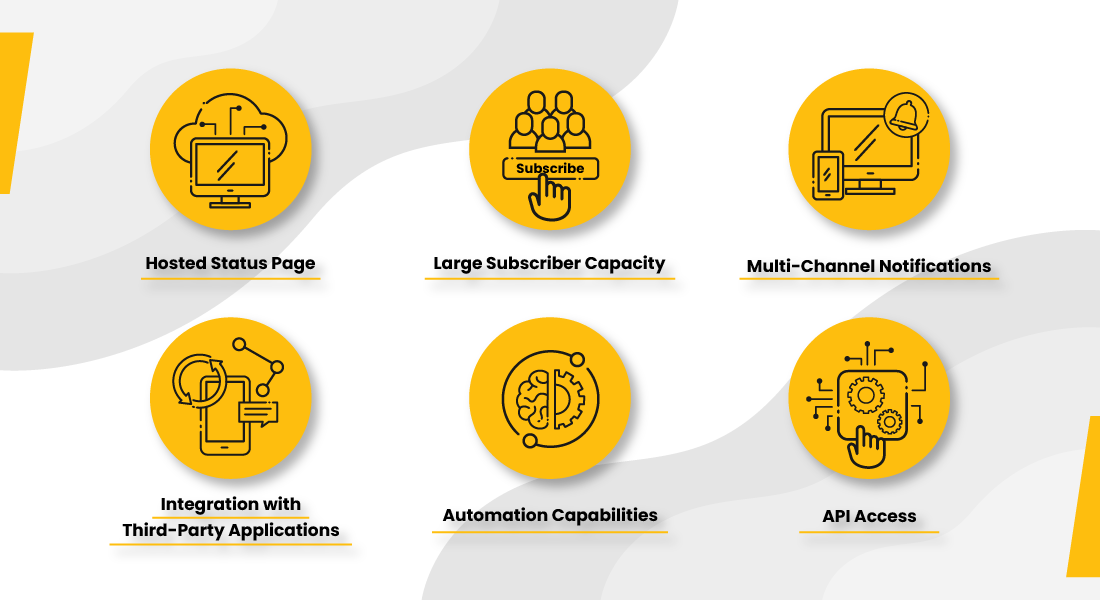
The quest for an efficient and scalable solution led VCU to StatusCast. StatusCast offered a status page that could handle a lot more subscribers, provided deep and intuitive integrations with third party services, and a vast capacity for notifications.
StatusCast’s integration beacons were particularly attractive as they allowed VCU to automate the process of updating and publishing statuses. They helped eliminate manual intervention between monitoring tools and the status page and provided ways to accelerate communication. This was in stark contrast to their old system which relied heavily on manual updates and had no provision for automation.
Additionally, the customizable nature of StatusCast allowed VCU to tailor their communication to the needs of their diverse community. With StatusCast, not only was VCU able to engage more subscribers, but they also leveraged StatusCast’s API to disseminate information to their main VCU Technology Services website, Twitter, and a Slack channel. The latter was critically important as it would be accessed by IT staff across campus, ensuring that they remain informed of the latest status updates.
The value of StatusCast's solution, particularly for universities, lies in its capacity to provide a centralized location for updating the community about disruptions to critical services that could impact their work. VCU could now maintain a constant line of communication during service disruptions, which ensured their academic community stayed informed and productive.
StatusCast’s customizability was a game-changer for VCU. The integrations with apps like Slack and Twitter, SMS integrations, service beacons, along with customizable templates and messages provided a degree of flexibility and efficient communication during outages not possible with other status pages. This enabled VCU to design a status page tailored to its specific needs and audience, significantly enhancing user experience and clarity during downtime.
The results after implementing StatusCast were significant. StatusCast supported an increase in their subscriber count from 200 to 800, with enhanced subscription level views and controls. VCU also saw a significant increase in status page traffic to over 3 million page views, signifying a new Schelling point for community members; when services go down, everyone looks to the status page.
VCU leveraged StatusCast's API to integrate status information into the VCU Technology Services main page, as well as Twitter and Slack to make the system's status instantly visible across multiple channels. This integration has made the status page a more integral part of the user experience, promoting awareness and increasing usage.
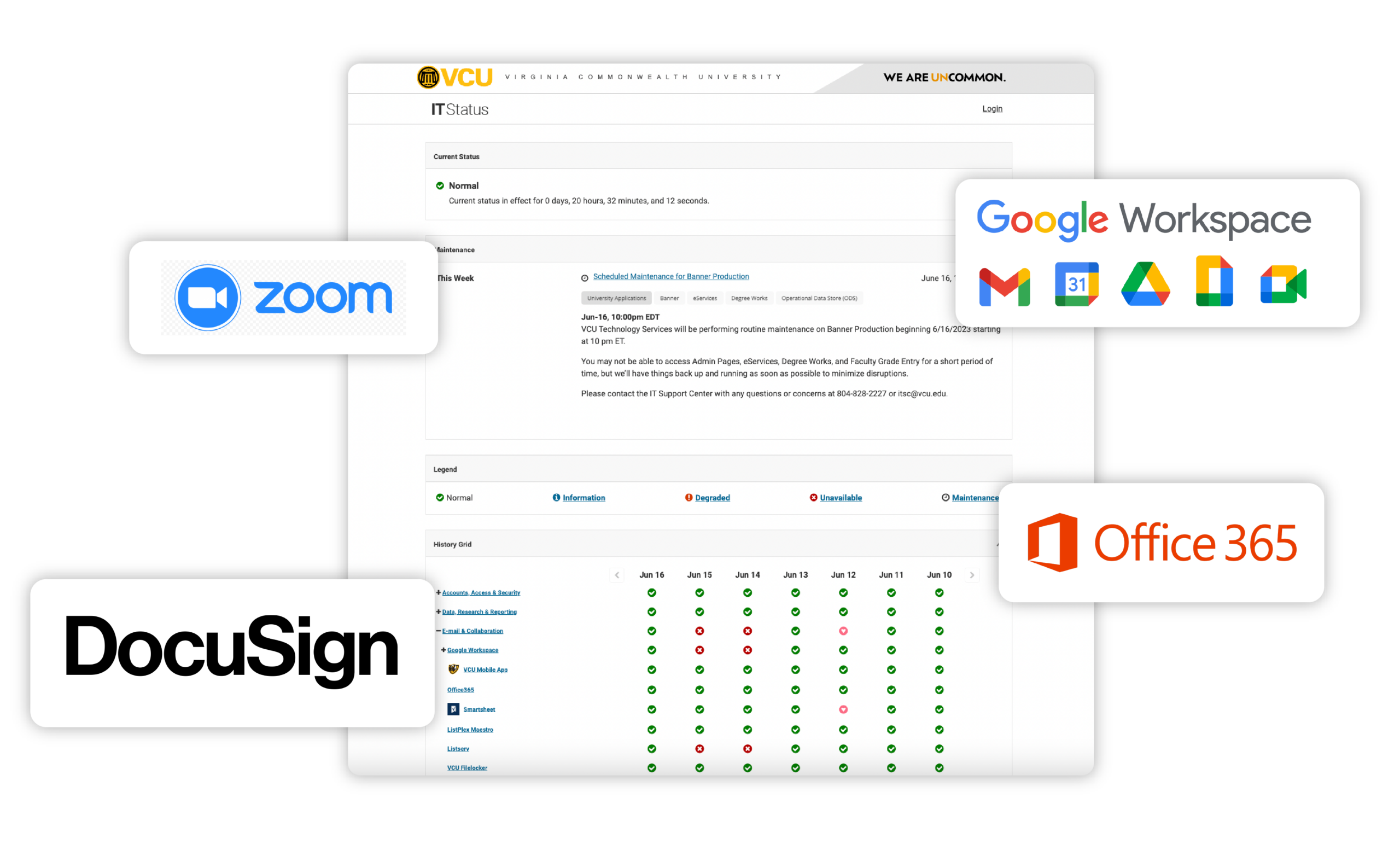
In VCU’s search for a status page solution, the capability to integrate with third party services was high on their list. With StatusCast, VCU’s status page integrated with various third party services that their community members rely on. Students and faculty were given visibility into the real time status of services like Office 365, Google Workspace, Docusign and more.
Faculty and support teams were given a leg up with this new line of communication, noting its role in timely and effective information distribution to the community during major incidents. This led to an improvement in productivity as the IT team could focus on restoring services during outages rather than manually managing and communicating status updates.
By leveraging StatusCast, VCU successfully transformed its approach to managing major IT incidents. After meeting their initial criteria for a highly customizable, user-friendly, hosted status page solution, StatusCast proved to be a reliable bedrock for the foundation of VCU’s incident communication. StatusCast's capabilities, from its extensive notification functionality to advanced integrations and automation, were integral to the transformation in how VCU managed their critical IT infrastructure. This could serve as an effective blueprint for other top tier universities looking to optimize their incident communication and enhance productivity during service disruptions.
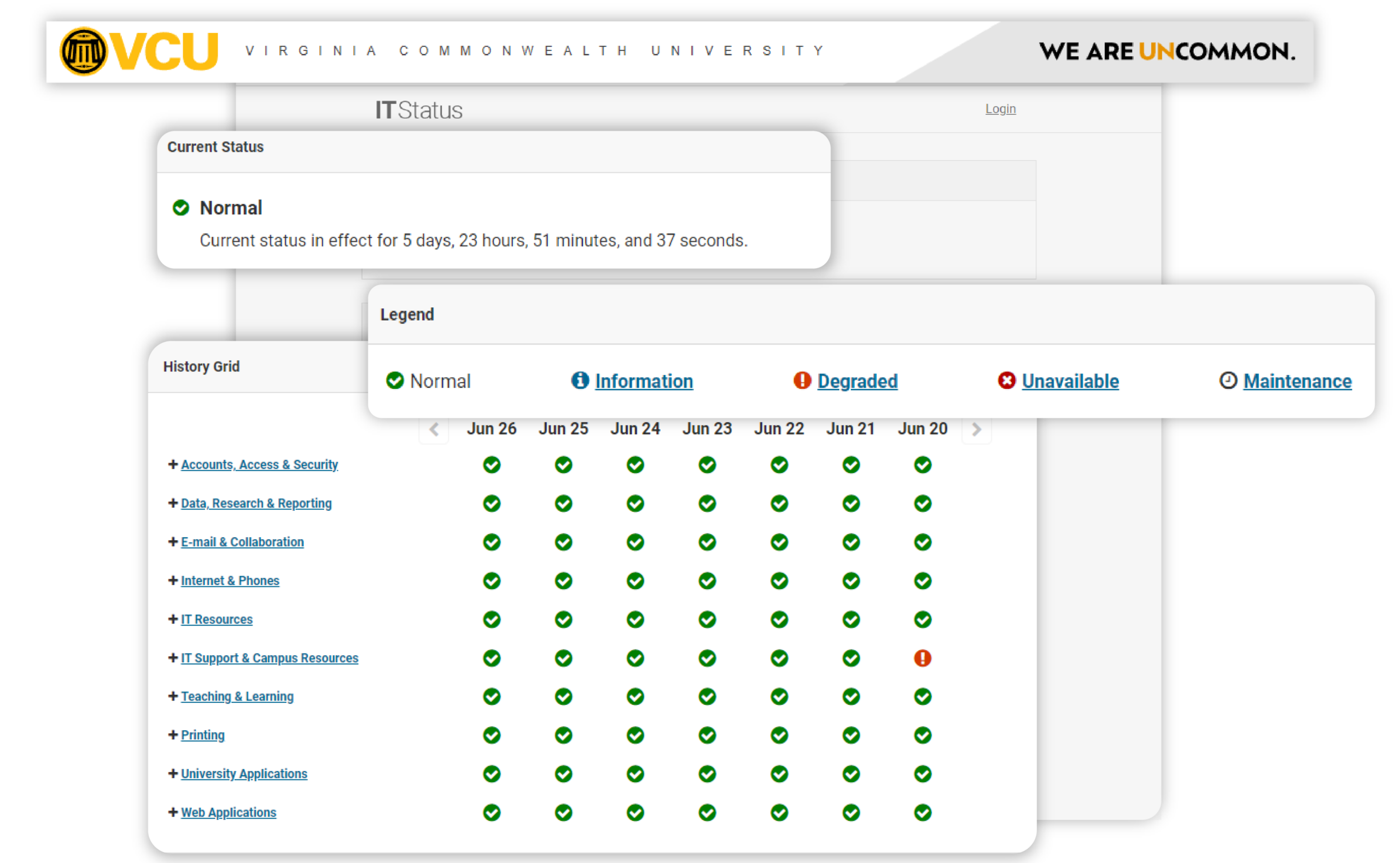
See how digital communication giant Cisco harnessed StatusCast’s private status page to revolutionize their internal incident communication across a global workforce of 80,000 employees.
Explore how QuickBase, a renowned cloud database solution for custom business applications, leveraged StatusCast to optimize uptime reporting and improve incident communication for over 6,000 clients.
© Copyright StatusCast 2022 | Terms & Conditions | Privacy Policy
© Copyright StatusCast 2022 |Terms & Conditions |Privacy Policy

